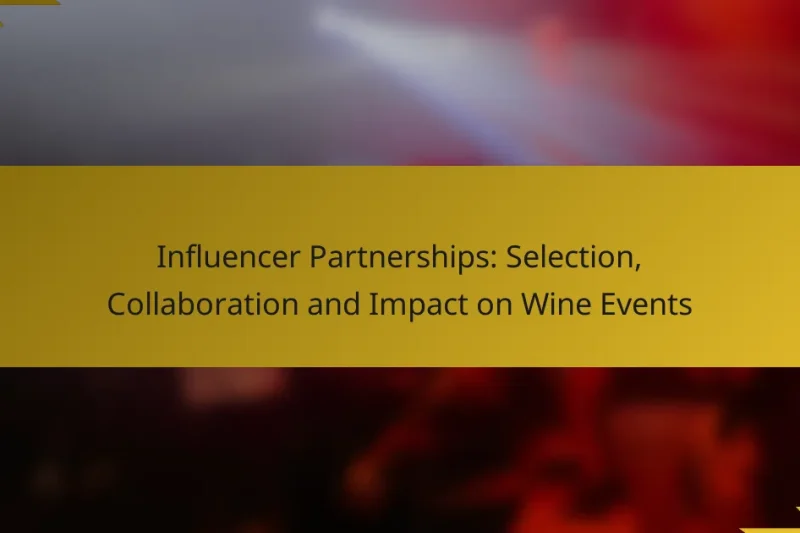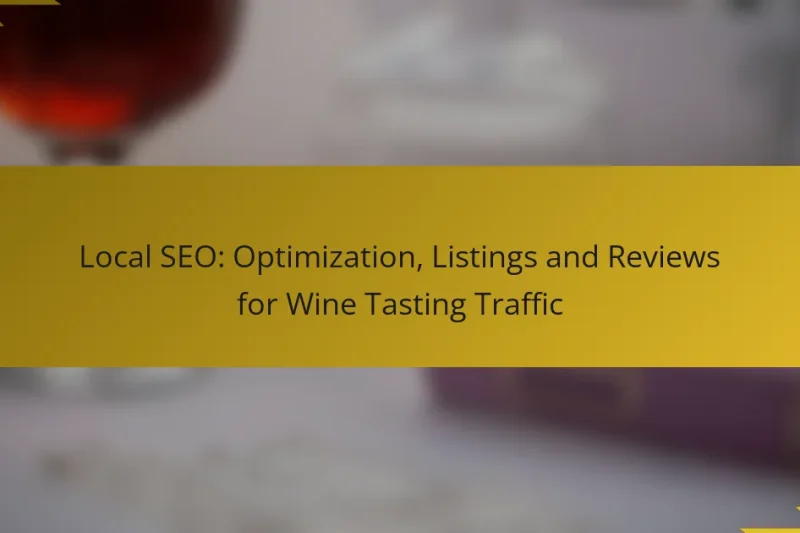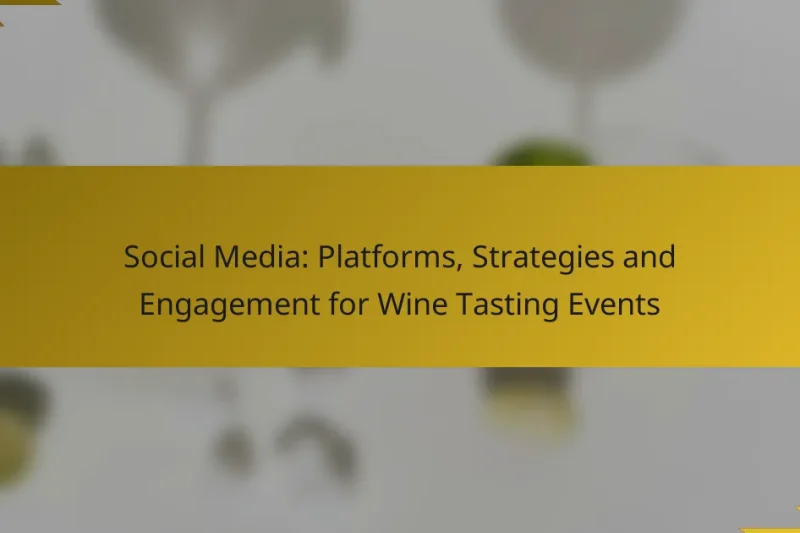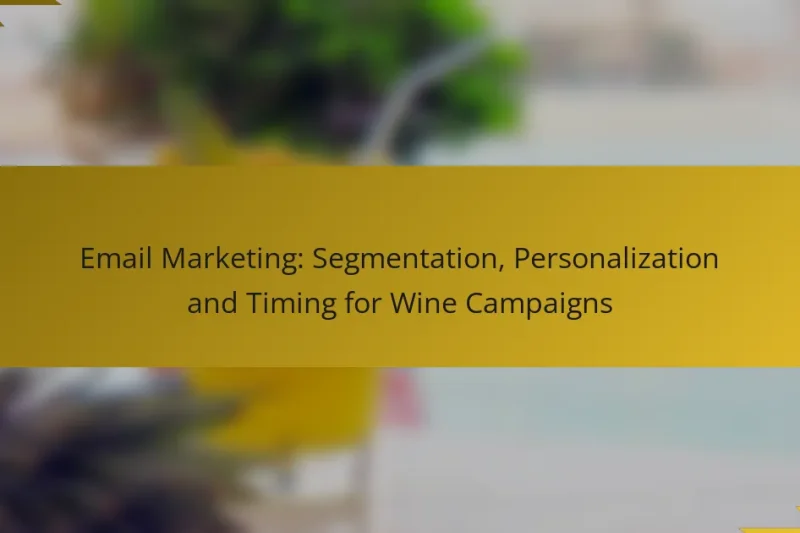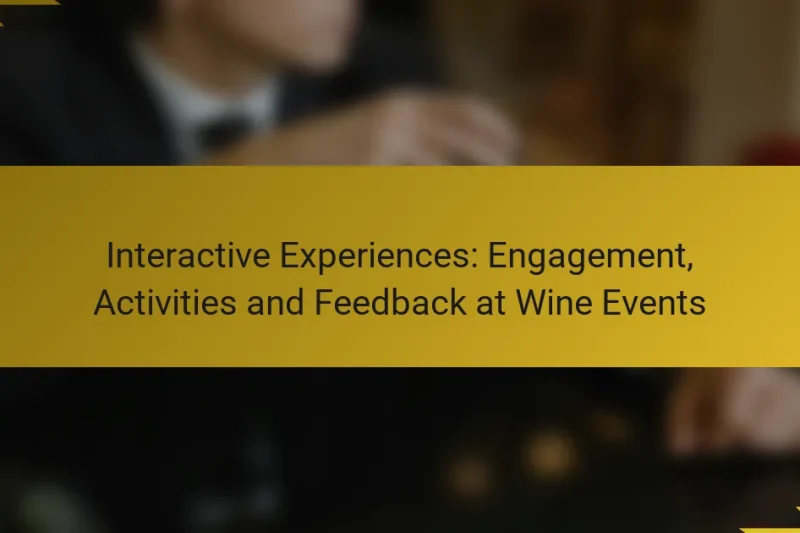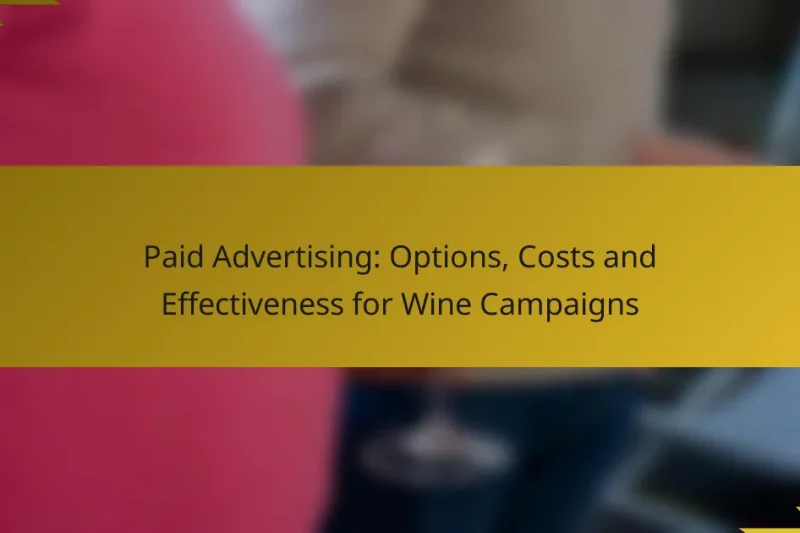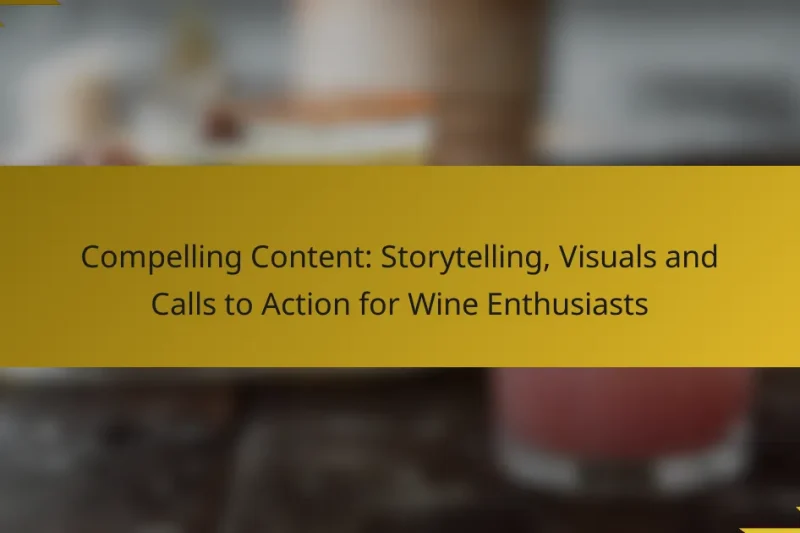Influencer partnerships play a crucial role in the success of wine events by enhancing brand visibility … Influencer Partnerships: Selection, Collaboration and Impact on Wine EventsRead more
Wine Event Marketing Strategies
Wine event marketing strategies are essential for attracting and engaging potential attendees. By leveraging social media, email marketing, influencer partnerships, and content marketing, organizers can create a dynamic approach that resonates with wine enthusiasts and maximizes event attendance.
Local SEO: Optimization, Listings and Reviews for Wine Tasting Traffic
Optimizing local SEO for wine tasting experiences is essential for attracting visitors to your winery. By … Local SEO: Optimization, Listings and Reviews for Wine Tasting TrafficRead more
Social Media: Platforms, Strategies and Engagement for Wine Tasting Events
Social media plays a crucial role in enhancing wine tasting events by increasing visibility and fostering … Social Media: Platforms, Strategies and Engagement for Wine Tasting EventsRead more
Email Marketing: Segmentation, Personalization and Timing for Wine Campaigns
Email marketing for wine campaigns can be significantly enhanced through effective segmentation, personalization, and strategic timing. … Email Marketing: Segmentation, Personalization and Timing for Wine CampaignsRead more
Interactive Experiences: Engagement, Activities and Feedback at Wine Events
Interactive experiences at wine events play a crucial role in enhancing attendee engagement and fostering memorable … Interactive Experiences: Engagement, Activities and Feedback at Wine EventsRead more
Paid Advertising: Options, Costs and Effectiveness for Wine Campaigns
Paid advertising offers wineries a powerful way to reach their target audiences and boost sales through … Paid Advertising: Options, Costs and Effectiveness for Wine CampaignsRead more
Compelling Content: Storytelling, Visuals and Calls to Action for Wine Enthusiasts
In the world of wine marketing, compelling storytelling, striking visuals, and persuasive calls to action are … Compelling Content: Storytelling, Visuals and Calls to Action for Wine EnthusiastsRead more
What are effective wine event marketing strategies?
Effective wine event marketing strategies focus on engaging potential attendees through various channels to maximize reach and attendance. Utilizing a combination of social media, email marketing, influencer partnerships, content marketing, and event sponsorships can create a comprehensive approach that resonates with wine enthusiasts.
Social media campaigns
Social media campaigns are essential for promoting wine events, as they allow for direct engagement with a targeted audience. Platforms like Instagram and Facebook are ideal for showcasing event visuals, sharing updates, and creating buzz through countdowns and contests.
Consider using paid ads to reach specific demographics, such as wine lovers aged 25-45. Engaging posts that encourage user-generated content can also enhance visibility, as attendees share their experiences and tag your event.
Email marketing
Email marketing remains a powerful tool for wine event promotion, enabling direct communication with interested individuals. Building a segmented email list allows for personalized messages that highlight event details, ticket sales, and exclusive offers.
Sending a series of emails leading up to the event can keep potential attendees informed and excited. Include a clear call-to-action and consider offering early bird discounts to encourage prompt registration.
Influencer partnerships
Partnering with influencers in the wine industry can significantly enhance your event’s visibility. Influencers can share their experiences and promote your event to their followers, providing authentic endorsements that resonate with potential attendees.
Choose influencers whose audience aligns with your target demographic. Offering complimentary tickets or exclusive access can incentivize them to promote your event effectively.
Content marketing
Content marketing involves creating valuable and informative content that attracts and engages potential attendees. Blog posts, videos, and infographics about wine trends, tasting tips, or event highlights can draw interest and establish your brand as an authority in the wine space.
Distributing this content through your website and social media channels can drive traffic and increase awareness of your event. Consider using SEO strategies to optimize content for search engines, making it easier for wine enthusiasts to discover your event.
Event sponsorships
Event sponsorships can enhance your wine event’s profile and attract a larger audience. Collaborating with local businesses, wineries, or wine-related brands can provide mutual benefits, such as shared marketing efforts and increased resources.
When seeking sponsors, focus on those that align with your event’s theme and values. Offering sponsorship packages with varying levels of exposure can appeal to different businesses, ensuring you secure support while enhancing the event experience for attendees.
How can social media enhance wine event marketing?
Social media can significantly boost wine event marketing by increasing visibility, engaging potential attendees, and fostering community interaction. Platforms like Facebook and Instagram allow for targeted outreach and creative storytelling that resonate with wine enthusiasts.
Targeted ads on Facebook
Targeted ads on Facebook enable wine event marketers to reach specific demographics based on interests, location, and behaviors. By creating ads that highlight event details, special offers, or early bird tickets, marketers can attract a focused audience likely to attend.
Consider setting a budget that allows for A/B testing of different ad formats and messages. This can help identify what resonates best with your target audience, optimizing your ad spend for maximum impact.
Instagram storytelling
Instagram storytelling is a powerful tool for showcasing the atmosphere and unique experiences of wine events. Use features like Stories and Reels to share behind-the-scenes content, interviews with winemakers, or highlights from past events.
Incorporate visually appealing images and videos to capture attention. Utilizing relevant hashtags can also broaden your reach, connecting with users who share a passion for wine and events.
Engagement through polls and contests
Engagement through polls and contests can create excitement and anticipation for wine events. Polls can gauge interest in specific wines or activities, while contests can encourage sharing and participation, increasing visibility.
For example, consider running a photo contest where participants share their favorite wine moments, with the winner receiving free tickets or exclusive access to the event. This not only promotes the event but also builds a sense of community among wine lovers.
What role does email marketing play in wine events?
Email marketing is crucial for promoting wine events as it allows for direct communication with potential attendees. It helps build excitement, provides essential information, and encourages ticket sales through targeted messaging.
Personalized invitations
Personalized invitations can significantly increase engagement for wine events. By addressing recipients by name and tailoring content to their preferences, you can create a more inviting experience. Consider segmenting your email list based on past attendance or wine preferences to enhance relevance.
Utilize eye-catching designs and compelling subject lines to capture attention. Including exclusive offers or early bird pricing can further incentivize recipients to RSVP.
Event reminders
Sending event reminders is essential to ensure attendance at wine events. Aim to send reminders a week before and a day prior to the event, as this can boost turnout rates. Highlight key details such as date, time, location, and any special guests or activities planned.
Incorporate a countdown timer in your emails to create urgency and excitement. This visual cue can motivate recipients to finalize their plans and attend the event.
Post-event follow-ups
Post-event follow-ups are vital for maintaining engagement after a wine event. Sending a thank-you email to attendees can foster goodwill and encourage future participation. Include a brief survey to gather feedback, which can help improve future events.
Consider offering exclusive content, such as access to event photos or a special discount on future events, to keep the connection alive. This can enhance customer loyalty and increase the likelihood of repeat attendance.
How to choose the right influencers for wine events?
Selecting the right influencers for wine events involves identifying individuals who resonate with wine culture and can effectively engage their audience. Focus on influencers who not only have a passion for wine but also align with your brand values and target demographic.
Relevance to wine culture
Influencers should have a genuine connection to wine culture, showcasing knowledge and appreciation for various wine types, regions, and pairings. Look for those who regularly create content about wine, attend wine-related events, or have a background in the industry.
Assess their previous collaborations and content to ensure they authentically represent the wine lifestyle. A strong alignment with wine culture enhances credibility and attracts a more engaged audience.
Engagement rates
High engagement rates are crucial when selecting influencers, as they indicate how actively their audience interacts with their content. Aim for influencers with engagement rates above 2-3%, which suggests a loyal and responsive following.
Evaluate metrics such as likes, comments, and shares relative to their follower count. Tools like social media analytics can help you gauge these figures and identify influencers who drive meaningful conversations around wine.
Audience demographics
Understanding the audience demographics of potential influencers is vital for ensuring they align with your target market. Analyze factors such as age, location, and interests to confirm that their followers match the profile of your ideal wine event attendees.
Consider using audience analysis tools to gather insights on their followers. This data can help you make informed decisions and select influencers who can effectively promote your wine event to the right people.
What are the key metrics for measuring success in wine event marketing?
The key metrics for measuring success in wine event marketing include attendance numbers and social media engagement. These metrics provide insight into the event’s reach, participant interest, and overall effectiveness of marketing strategies.
Attendance numbers
Attendance numbers are a fundamental metric that reflects the level of interest in your wine event. Tracking the number of attendees helps gauge the effectiveness of your promotional efforts and can guide future event planning.
To assess attendance, consider comparing the actual turnout against your targets or previous events. A successful wine event typically sees attendance that meets or exceeds expectations, often aiming for growth of 10-20% year over year.
Additionally, segmenting attendance data by ticket type (e.g., general admission, VIP) can provide deeper insights into customer preferences and pricing strategies.
Social media engagement
Social media engagement measures how effectively your wine event resonates with audiences online. Metrics such as likes, shares, comments, and follower growth can indicate the event’s popularity and reach.
To enhance social media engagement, create shareable content before, during, and after the event. Use engaging visuals, behind-the-scenes footage, and interactive posts to encourage participation. Aim for a minimum engagement rate of 1-3% for successful campaigns.
Monitoring hashtags related to the event can also help track conversations and sentiment, allowing for real-time adjustments to your marketing strategy.
